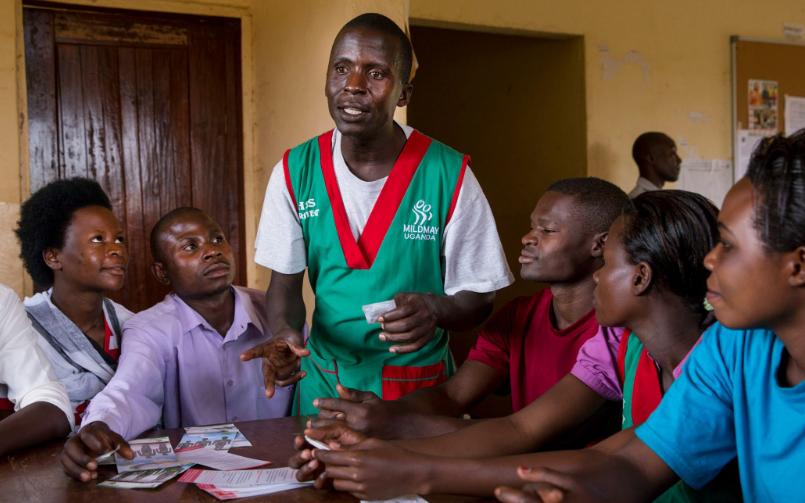Provider Behavior Change Toolkit: Family Planning Focus
Image

Subtitle
Placing Empathy at the Heart of Provider Behavior Change: A Toolkit for Understanding Provider Behavior and Co-Designing Solutions
SummaryText
"The tools let us understand the health care provider better as a person. It helps you fully appreciate the environment that the provider is working in, which helps us work on facts and not just
assumptions." – Mabel Naibere, United States Agency for International Development (USAID)/Social and Behavior Change Activity (SBCA) Technical Specialist in Human-Centered Design
Healthcare providers, including those who work in family planning (FP) and reproductive health (RH), operate in complex systems, and factors such as social norms, client interactions, and individuals' own beliefs and attitudes influence their behaviour. The Provider Behavior Change Family Planning (PBC FP) toolkit supports the design, implementation, and evaluation of facility-based PBC initiatives within FP and reproductive health (FP/RH) programmes. Building on the Provider Behavior Ecosystem Map developed by Breakthrough ACTION in 2020, the resource offers a holistic, yet rapid and flexible, process for supporting providers in adopting and maintaining positive behaviours.
The PBC FP toolkit offers users practical tools for doing the following: improving service delivery and adherence to FP; improving the client experience and boosting trust in and demand for FP services guidelines; increasing the adoption or maintenance of desired behaviours among clients; improving FP and overall health outcomes; and increasing provider job satisfaction.
To deliver a holistic view of provider behaviour, the toolkit employs a systems lens. The toolkit also uses a multi-level approach to gather perspectives and input on provider behaviour from a variety of stakeholders. It positions providers as part of the inquiry and solution development process rather than as part of the problem.
The toolkit guides users through an empathy-focused, 4-step process that supports providers, clients, and district health teams in identifying and prioritising the root causes of provider behaviour and generating locally appropriate solutions. The steps include:
Healthcare providers, including those who work in family planning (FP) and reproductive health (RH), operate in complex systems, and factors such as social norms, client interactions, and individuals' own beliefs and attitudes influence their behaviour. The Provider Behavior Change Family Planning (PBC FP) toolkit supports the design, implementation, and evaluation of facility-based PBC initiatives within FP and reproductive health (FP/RH) programmes. Building on the Provider Behavior Ecosystem Map developed by Breakthrough ACTION in 2020, the resource offers a holistic, yet rapid and flexible, process for supporting providers in adopting and maintaining positive behaviours.
The PBC FP toolkit offers users practical tools for doing the following: improving service delivery and adherence to FP; improving the client experience and boosting trust in and demand for FP services guidelines; increasing the adoption or maintenance of desired behaviours among clients; improving FP and overall health outcomes; and increasing provider job satisfaction.
To deliver a holistic view of provider behaviour, the toolkit employs a systems lens. The toolkit also uses a multi-level approach to gather perspectives and input on provider behaviour from a variety of stakeholders. It positions providers as part of the inquiry and solution development process rather than as part of the problem.
The toolkit guides users through an empathy-focused, 4-step process that supports providers, clients, and district health teams in identifying and prioritising the root causes of provider behaviour and generating locally appropriate solutions. The steps include:
- Prepare: Identify focus behaviours and facilities, and lay the groundwork for data collection and ideation.
- Inquire: Collect data on provider behaviour influences across several levels of the ecosystem, including the client, provider, community, workplace environment, and health system levels.
- Synthesise: Make sense of the data, and identify priority areas to target in programme design.
- Act: Generate solutions for supporting provider behaviour based on the needs identified.
- An instructions booklet that provides step-by-step guidance to prepare, implement, and use the toolkit; it includes sample schedules, mobilisation plans, and team structures.
- Preparation tools in the form of a behaviour mapping worksheet.
- Inquire tools (client scenario tools, a behavioural blueprint for providers, a behavioural blueprint for district health officers, an obervation guide for guided visits, and influencing factor cards) to help users identify and prioritise provider-related barriers and facilitators to the delivery of quality health services in multiple contexts.
- Synthesis tools that help users summarise information from the diagnostic process and prioritise challenges to be addressed by programmatic activities.
- Act tools, including a case study on using the PBC FP toolkit in Uganda, to help users design and implement more effective provider-related initiatives.
Publication Date
Languages
English, French
Source
Email from Jane Brown to The Communication Initiative on June 21 2023; and Breakthrough ACTION and RESEARCH website, June 27 2023. Image credit: Jonathan Torgovnik/Getty Images/Images of Empowerment. Some rights reserved.
- Log in to post comments
